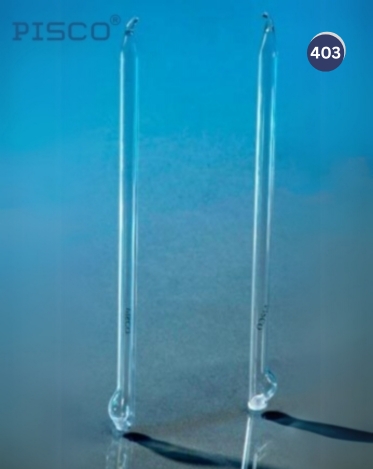Vacuum Pin Tube
- Home
- Vacuum Pin Tube



We are glad to introduce ourselves as a leading manufacturer (at our workshop) of Vacuum / Evacuated Pin Tubes since 1961 under the PISCO® Brand, which meets international standards and is extensively used for collecting samples from molten metal, like Steel / Gold / Platinum / Silver / Ferrous / Non-Ferrous Metals etc. required for Hydrogen analysis. The use of finest-grade Borosilicate Glass (3.3 Low Expansion) endows unmatched resistance against harmful substances. This leading attribute of our Vacuum / Evacuated Pin Tube makes them a highly reliable product. Our glass pin tubes are sealed at both ends with a thin-walled bulb (weak point) on one side.
PISCO® Brand Vacuum / Evacuated Pin Tubes (with adequate vacuum) feature a weak point that breaks in contact with molten metal. The molten metal then enters the tube to form a solid, slag-free metal pin every time.
In operation, the pin tube is held in a simple spring holder. The molten metal is removed from the furnace and the slag is pushed aside. The pin tube is immediately inserted into the molten metal at an angle of 45 degrees (approx.) until the thin walled bulb section is
completely immersed and this breaks the weak point of the glass tube and fills the pin tube with molten metal. Temperature Properties: As the Coefficient of thermal expansion of PISCO® glass is low, the thermal stresses under a given temperature gradient are consequently low and the glass can withstand higher temperature gradients and also sudden temperature changes/thermal shocks. Minute scratching of glass surface can however reduce its thermal resistance.
In general the “Strain Point” should be regarded as the maximum safe operating temperature of PISCO® glassware. When heated above 500°C the glass may acquire permanent stresses on cooling.
All PISCO® labware is annealed in modern ovens under strictly controlled conditions to ensure minimal residual stress in the products.
| Property | Value |
|---|---|
| Coefficient of Linear Expansion | 32.0 × 10−7/°C |
| Strain Point | 515°C |
| Annealing Point | 565°C |
| Softening Point | 820°C |
| Specific Heat | 0.2 |
| Thermal Conductivity | 0.0027 Cal/cm³·°C/sec |
| S. No. | Inner Diameter (I.D.) | Outer Diameter (O.D.) | Quantity per Tray | No. of Trays | Total Quantity per Carton Box |
|---|---|---|---|---|---|
| 1 | 2 mm. | 4 mm. | 25 | 60 | 1500 |
| 2 | 3 mm. | 5 mm. | 20 | 60 | 1200 |
| 3 | 4 mm. | 6 mm. | 17 | 60 | 1020 |
| 4 | 5 mm. | 7 mm. | 15 | 60 | 900 |
| 5 | 6 mm. | 8 mm. | 14 | 60 | 840 |